- Home
- Jack Gantos
Dead End in Norvelt Page 7
Dead End in Norvelt Read online
Page 7
“You shouldn’t be embarrassed,” Mom said, knowing that I was. “Money can mean a lot of different things. When I was a kid we traded for everything. Nobody had any cash. If you wanted your house built, you helped someone build theirs, and then they would turn around and help you build yours. It was the same with everything. I’d give you eggs and you’d pay me in milk.”
“I don’t think it works that way now,” I remarked. “If he fixed my nose I don’t think he’d want me to do brain surgery on him.”
“Not unless he wanted to become Dr. Frankenstein’s monster,” she replied with a laugh. “But seriously, it’s a shame the way this town has changed. Norvelt was set up so people who didn’t have a lot of cash could trade each other for things they needed to make a living. Instead of having to reach for your wallet you’d reach for a hammer and saw, or a plow, or baking pan—something to labor with. Money is just a way of measuring work, but you don’t need money if everyone agrees that trading one kind of work for another will do just as well.”
“I see,” I said, but I didn’t. None of the history books I ever read had people happily trading one thing for another. When I read The California Gold Rush no one lifted a finger unless they were paid in gold nuggets or gold dust. And Captain Kidd would have had his throat slit from ear to ear if he tried to pay his pirates in fish. When Alexander Graham Bell invented the telephone he did not give it away for free. They all wanted gold just like Pizarro and Cortés and just about everyone else.
“But everyone says cash is king. Not fruit and pickles.”
“Cash just means you can be a big shot and cut to the front of the line,” she said disapprovingly. “Or get what you want right away. It’s true that I wish I had enough cash to have your nose fixed. But for now I’ll just save up and we’ll pay as we go—that’s what regular people do.”
She bent down and gave me a kiss on my head which always made me feel better. “It doesn’t cost a penny to be sweet,” she said, smiling down on me. “Give me your hand.” She held hers openly toward me. “It makes me happy to pretend that I’m your older girlfriend.”
I grinned, and took a chance. “Then it would be better if your younger boyfriend wasn’t grounded so he could take you on a date to the drive-in and buy you presents.”
“But you are grounded, and not even cash can buy away your trouble,” she replied with resolve. “You’ll have to work off your punishment the old-fashioned way.”
“Can I trade being grounded for a different punishment?” I asked.
“Sure,” she said. “You can replant that whole field of corn, tend to it, harvest it, and turn it into food for poor old folks.”
I wished I could replant the field, but I knew Dad wouldn’t allow that trade. He’d make me mow it down a second time and then I’d be grounded for another year—if I was still alive.
8
I was eating from a jar of pickles in the kitchen and reading my favorite column in the newspaper:
June 23, 1611: Henry Hudson was set adrift in Hudson Bay by mutineers and never seen again.
June 23, 1683: William Penn signed a peace treaty with the Lenni Lanape Indian tribe, covering land that would become part of our Great State of Pennsylvania.
I was wishing I could sign a peace treaty with my parents when the telephone rang. Mom picked it up and listened, then turned toward me as she said, “Yes, Miss Volker. I’ll send him right down.”
“I guess being a good neighbor is better than cash,” I said brightly, trying to be charming.
“You got me there,” she replied, “but after you help her you turn right around and march back home. No baseball or any monkey business. Understand?” Her last word was punctuated with an arching eyebrow.
“Yep,” I said, and dashed for the door. “I promise.”
It took me less than a minute to run down to Miss Volker’s yellow house which was glowing under the morning sun as if it had been carved out of melting butter. It made me squint to look at it, but as I arrived I saw she was waiting impatiently on her porch. She must have had her hair recently colored because it was so blue it looked like a massive hydrangea blossom. “Hurry,” she called out, and waved one of her red claws at me. “I just got a call about another possible dead person—a Norvelt original!”
“Who called?” I asked.
“A spotter,” she said in a hushed tone.
That sounded mysterious. “What’s a spotter?”
“One of my network of spies who keeps an eye open on the last of the Norvelt folks. You know—someone who notices if they make it to church, or miss. Or if they go to the grocery store or pick up their mail, things like that. So I got a call today about Mrs. Dubicki over at house number C-27. My spotter has not seen her for a week and I know she hasn’t been feeling well, poor thing.”
“So?” I asked.
“So, we must go over there immediately,” she insisted, and leaned her blue bush of hair toward the garage. “I keep dialing her number but no one answers. We must go find out if that phone will never be answered.”
“How do we get there?” I asked.
“We’ll take the car, and if we can’t spot her from the road we’ll have to stop and look in her windows, and if we still can’t see her then we’ll have no other choice—you’ll have to sneak into the house,” she reasoned.
“What if she’s alive and recognizes me?” I said fearfully. “She’ll call the cops and I’ll be grounded forever only in a jail cell. It would be best if you went in because nobody will arrest an old lady.”
“I can’t go in,” she replied. “I’m the medical examiner in this town. When I show up people know I’m going to pronounce someone dead, sign their death certificate, hand them over to Mr. Huffer, and then write their obit. No one alive wants a visit from me. These old folks scatter like pigeons when I follow them up and down a grocery store aisle.”
“Well, what should we do?” I asked.
“Hmmm,” she said, thinking out loud. “It would be best if you wore a disguise.”
“I have my Halloween costume from last year,” I suggested.
“Of what?” she asked.
“The Grim Reaper,” I said.
She threw her head back and her cackling laugh showed off her old-lady teeth which looked like a couple rows of tiny marble tombstones. “You are my perfect partner,” she said grandly. “Mrs. Dubicki’s going to have to see the Grim Reaper sooner or later, so it might as well be sooner. Now go fetch it—and hurry! I’ll wait for you by the car.”
I ran back across the yards and sneaked around the pony pen to the back of our garage and opened that half door Dad had showed me. My costume was hanging up in an overflow closet full of out-of-season coats and my grandparents’ clothes that Mom couldn’t bear to give away. I grabbed the costume, the mask, and the long-handled plastic scythe. I was just sorry I didn’t have Mrs. Slater’s false teeth with me because that would make it even more spooky. Then as quickly as I had run up to the garage I turned and ran down to Miss Volker’s car.
I just figured she would drive because she was the adult, but she was standing on the passenger side. “The keys are in the ignition,” she said. “Now open the door for me.”
“I’ve only driven a tractor,” I said nervously. “I don’t know if I can really drive a car.”
“It’s the same,” she said. “Just go slow and it won’t matter if you hit anything.”
“But what if I slowly drive off a cliff?” I asked.
“You’ll have more time to pray before you hit the bottom,” she said impatiently. “Now try to be a man and let’s get going.”
I threw the costume in the backseat. I opened the passenger door and helped her in, then ran around the front of the red Plymouth Valiant. It was a small car but I was still worried because I was even smaller. When I sat in my dad’s truck and pretended to drive I had a hard time reaching the pedals while still sitting high enough on the seat in order to see out the windshield. I could do one or the other
, but not both. Luckily Miss Volker’s car was a lot tighter inside, and after I scooted the seat all the way forward and stretched my legs out I could reach the gas pedal and just enough of the brake.
“Turn the key,” she ordered. “Hurry.”
I turned the key and it started right up.
“Now put it in Drive,” she snapped. “Come on. You’re moving like a snail. That woman might be in trouble, or dead, and if she is I should be the first to know. That vulture Mr. Huffer is always beating me to the body, but it’s my job to first pronounce a dead person dead before he calls their family and tries to sell them a casket and all the pricey trimmings.”
I pushed a button on the dashboard, which had a big D for Drive on it, and tentatively pressed down on the gas and we inched forward.
“More gas!” she insisted. “Gun it.”
I gave it a lot more gas and we flopped back into our seats. I got scared and hit the brakes and we both jerked forward.
“Do you want me to drive?” she barked, and held up her ruddy claws.
“I’ll get the hang of it,” I said nervously. “It’ll just take a minute.” I gave it more gas and slowly we crept forward, and I turned out of the driveway and onto the Norvelt road.
“She just lives a few streets down,” Miss Volker informed me, and pointed the way with her bent-up fingers.
As I felt comfortable behind the wheel I gave the Valiant more gas. For a second I dared to take my eyes off the road and glance at the speedometer to make sure I wasn’t breaking the law. We were going fifteen whole miles per hour.
“I can run faster than you drive,” she said, and was so exasperated she suddenly lurched forward and stomped her foot down over mine. The engine revved and my heart beat faster and I gripped the steering wheel as we flew down the road.
“This is more like it,” she said.
“Miss Volker, you are scaring me,” I said in a nervous voice.
“Hush up and turn here,” she ordered, and lifted her foot off of mine as she pointed to the left.
I turned wildly and our tires squealed as we nearly clipped a mailbox, and when I straightened up we went along a curvy road lined with maple trees. Finally Miss Volker reached over and hooked the steering wheel with her stiff thumb and we careened off the road and hopped the dirt curb onto the overgrown weeds, which was really Mrs. Dubicki’s front lawn. I put all my weight onto the brake pedal and we slid sideways to a stop. By then I was panting like a dog.
“This is her house,” she said. “She hasn’t painted it since 1934. I like Mrs. Dubicki because that busybody Spizz gave her a ticket for having a shabby-looking house and she chased him off the property with her dead husband’s double-barreled shotgun.”
We both stared at the faded green house with dirty white shutters. I’m not sure what I expected to see—maybe a flag at half mast in respect for the dead. “All the curtains are closed,” I whispered, “and they are black.”
“Those are her old blackout curtains from the war,” Miss Volker explained. “It’s not a good sign they are closed,” she added. “Most people prefer to die in the dark. My guess is that she’s history, but you have to go in there and confirm it. Just enter the house and come back with a detailed report on what you find.”
“Do I have to?” I asked. I really didn’t want to sneak into a house and stumble around like the Grim Reaper who had come to harvest Mrs. Dubicki. What if she wasn’t dead and still had that giant gun she was going to shoot Spizz with? Or what if she was dead and I didn’t see her and I stepped on her? That would scare me so much my nose would probably explode like a blood grenade.
“Just think how unfair it would be,” Miss Volker mused, “if I wrote her obituary and she was still alive. Now that would be cruel if the shock of reading about her own death killed her. Besides, she’s on death’s doorstep already. I happen to know that she has a heart that’s about to quit.”
“Okay,” I said reluctantly. “I’ll do it. But don’t you dare tell my mom.”
“Cross my heart,” she promised, and raked her stiff fingers across her chest.
I got out of the car and opened the rear door. In a moment I had my costume on and was stumbling up the sidewalk. The hooded mask kept slipping down over my eyes and I held my scythe straight out like a lance so I didn’t run face-first into something solid. After I made it up the front steps I reached forward and touched the doorknob and gave it a turn. It wasn’t locked so I pushed it open. “Mrs. Dubicki,” I called out. “Are you alive?”
I heard something scratchy that I couldn’t make out.
“Mrs. Dubicki,” I called again. “Did you say something?”
Again I heard sounds but they were muffled. Oh cheeze, I thought. I bet a burglar broke in and left her tied up with a gag around her mouth.
With the blackout curtains closed and the mask half covering my eyes it was dark inside the hallway as I shuffled forward with my scythe waving in front of me. I came to a wall and turned left. I was going in the right direction because the scratchy sound grew louder.
“Mrs. Dubicki?” I shakily called. “Hello? Are you alive?”
Once I got a little ways along the hall I could see light peeking out from under an interior door. That was promising. I shuffled down there and tap, tap, tapped on the door with my scythe. “Mrs. Dubicki,” I asked in a scared-little-boy voice, “are you bound and gagged? Or if you have a gun please take the bullets out. And if you are dead could you please come back to life because I’m really afraid of dead people.”
I slowly opened the door and peeked into the dimly lit room. Oh, it was sad. There she was, slumped all the way back in a recliner about two feet in front of the TV. The Pittsburgh news was on and an announcer was talking about where people could receive their second round of polio vaccine. Miss Volker had stressed that if I found Mrs. Dubicki dead to pinch her arm and make certain she wasn’t just napping because, as she said, “When old people nap they look like cadavers.”
“Mrs. Dubicki,” I whispered. “Are you taking an old-lady catnap?”
I wished she’d pop awake and let out a demonic laugh and just go ahead and scare me witless. I mean, what if she was alive? What would I say to her? What?
I stepped forward, took a deep breath, and poked her on the shoulder with my plastic scythe. “Mrs. Dubicki?” I said politely. “If you are still among the living could you please inform me so I don’t have to pinch you?”
She didn’t move a muscle. I took a deeper breath, reached out, and pinched the spotted old skin on her lifeless forearm.
Suddenly she sat straight up and I jumped back and froze. She was silent at first as she batted her eyes and shook the sleep off. Was she like Lazarus and had just now come back from being dead? Or had she never died to begin with? I didn’t know. And then she slowly turned toward me and crossly asked, “Who the blazes are you and what are you doing in my house?”
I guess I should have planned in advance to say something smart to her, but since I hadn’t given it any thought I just replied with “Hi, I’m the Norvelt Grim Reaper for the Public Good.”
“I can see that,” she said, not at all astonished. “I’m not blind. Have you come for me?”
“Someone reported you dead,” I replied.
“As far as I know I’m alive,” she responded, and took a raspy breath to prove it to herself. “My heart has been giving me fits lately and so I’ve just been lying low for a few days, but I don’t think I’m ready to kick the bucket.”
“That’s fine,” I said nervously because my heart was very much alive and pounding in my chest. I began to back away. “I can come back some other time.”
“I’m not afraid of death,” she said calmly. “I’d just like to time my earthly exit so I don’t miss my grandson’s birthday on July third. Would that be okay with you?”
“Oh, no problem,” I said quickly. “Take all the time you need. I’m in no rush. There are plenty of other dying people I can visit.”
“Well, w
hat about you come back in two weeks,” she said, rubbing her chin and thinking about what she just said. “Yeah, two weeks will give me time to wrap up my business, say all the goodbyes I care to say, and then I’ll be ready to meet my husband in heaven. Will that fit your calendar, Mr. Reaper?”
“Umm, I’ll check my schedule,” I quickly replied, “but I think I can fit you in.”
“Would you like a cup of tea?” she asked.
“No thanks,” I replied, and politely stood there while she chattered on. Finally I looked at my wrist even though I didn’t have a watch on. “Time to go,” I announced, and took a step back.
“You don’t have to go,” she implored with a touch of loneliness in her voice. Still, I kept inching back toward the door.
Just then I could hear Miss Volker hitting the car horn. “I’m sorry,” I explained to Mrs. Dubicki, “but my chariot is calling for me.”
“What?” she asked.
“You know, my chariot with the four deathly black horses,” I blurted out, then turned to run.
“Wait!” she shouted. “I just remembered that Karen Linga down the street fell and broke her hip and she’s in so much pain she is begging for you to come take her away.”
“Thanks for the tip,” I said, and once I started running I could not slow down. I bounced off the walls and my scythe whacked some pictures sideways. I had left the front door open, and when I saw daylight I leaped across the threshold and down the few steps.
When Miss Volker saw me she stopped leaning on the horn. “What took you so long?” she shouted. “I could have died from boredom for all the time it took you to take her pulse.”
“We have to go,” I begged as I ripped off my mask and gasped for air. “She’s alive!”
“Dang,” she griped as I opened the door and hopped in. “I sure wish these old ones would hurry it up. They need to meet their maker because I’m not getting any younger and there are a few things I’d like to do in this world before my own Grim Reaper pays me a visit.”

 Jack Adrift
Jack Adrift Jack's New Power
Jack's New Power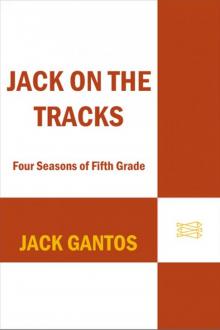 Jack on the Tracks
Jack on the Tracks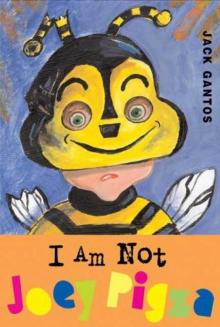 I Am Not Joey Pigza
I Am Not Joey Pigza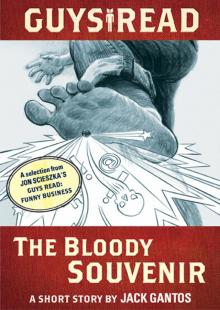 The Bloody Souvenir
The Bloody Souvenir Joey Pigza Loses Control
Joey Pigza Loses Control Heads or Tails
Heads or Tails Hole in My Life
Hole in My Life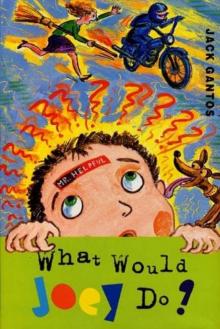 What Would Joey Do?
What Would Joey Do? The Trouble in Me
The Trouble in Me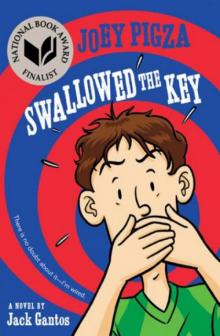 Joey Pigza Swallowed the Key
Joey Pigza Swallowed the Key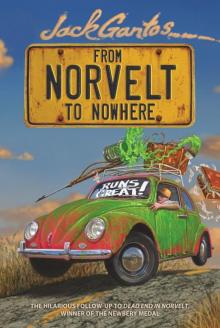 From Norvelt to Nowhere (Norvelt Series)
From Norvelt to Nowhere (Norvelt Series)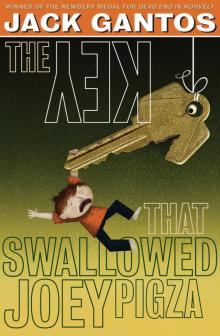 The Key That Swallowed Joey Pigza
The Key That Swallowed Joey Pigza Jack's Black Book
Jack's Black Book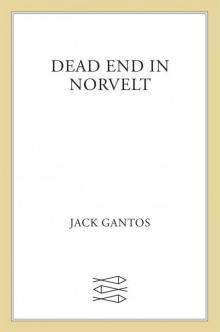 Dead End in Norvelt
Dead End in Norvelt